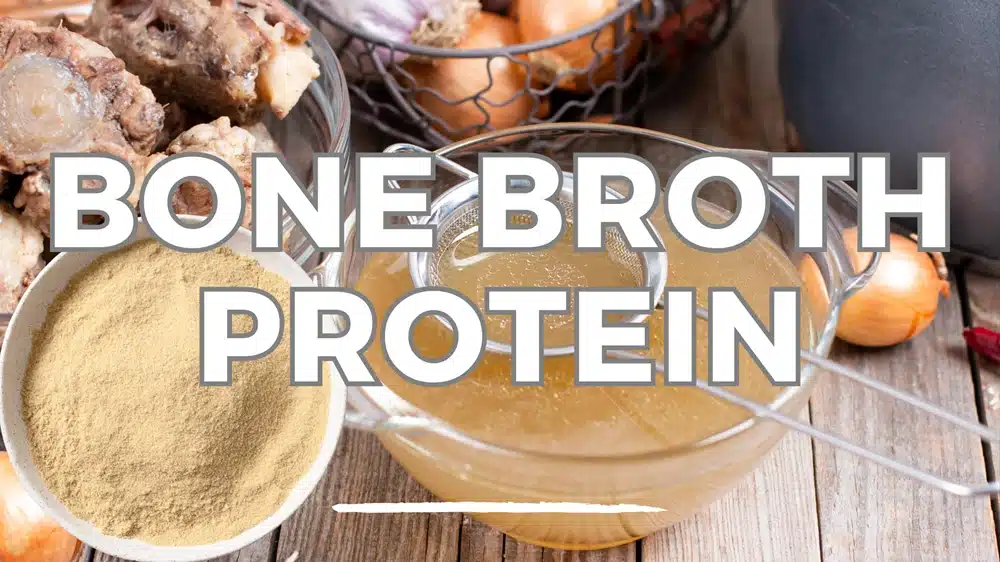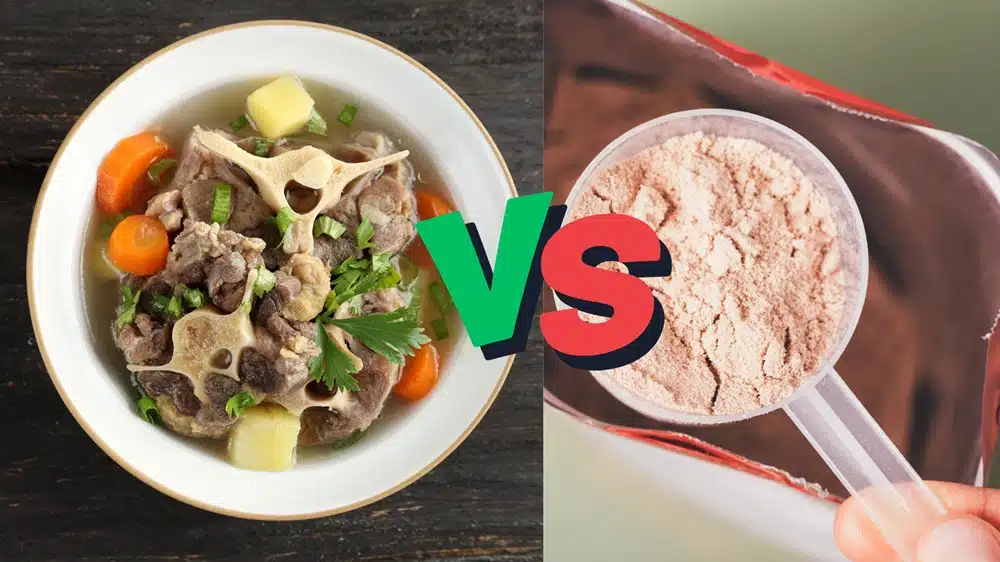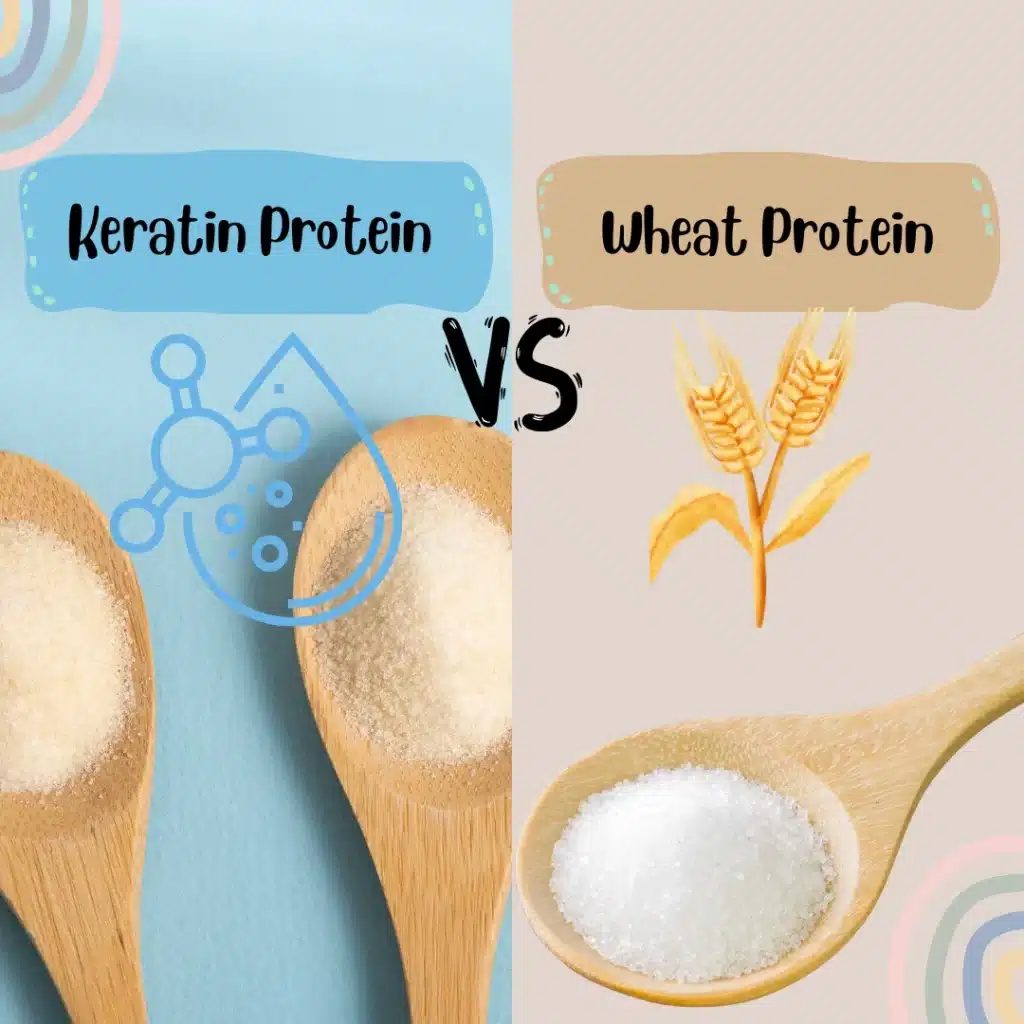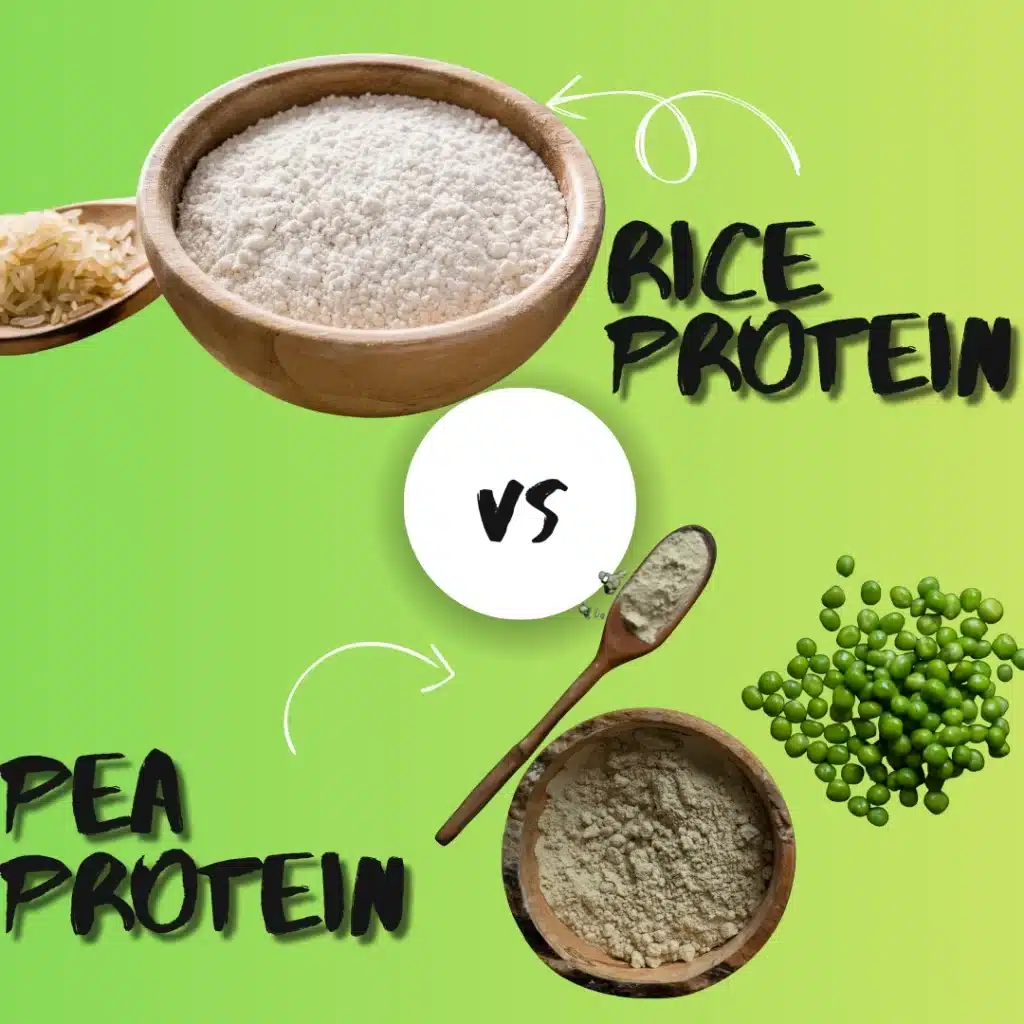Bone Broth Protein vs Whey: Picture yourself standing in the supplement aisle, shelves stacked with colorful tubs of protein powders, each promising to unlock your healthiest self. You spot two options that keep popping up: bone broth protein and whey protein. One claims to soothe your joints and gut, while the other is a gym-goer’s best friend for building muscle. But which one’s right for you? Honestly, it’s like choosing between a cozy, nourishing soup and a quick, energizing smoothie—both have their place, but it depends on what your body needs.
What is Bone Broth Protein?

Proteína de caldo de huesos is like the modern cousin of your grandma’s homemade soup. It’s made by simmering animal bones—usually chicken or beef—along with connective tissues for hours, sometimes days, to extract a nutrient-rich broth. This broth is then dehydrated into a powder, making it a convenient addition to shakes, smoothies, or even baked goods. It’s one of those ingredientes de los suplementos dietéticos that’s gained traction for its unique nutritional profile, especially in fabricación de polvo for health-focused products.
How is Bone Broth Protein Made?
The process is a bit like crafting a hearty stew. Bones, ligaments, and tendons are cooked under high pressure and heat to release nutrients like collagen, amino acids, and minerals. The broth is then dried at low temperatures to preserve its goodness, resulting in a fine powder. Many companies offer Soluciones OEM to create custom bone broth protein powders, tailoring them to specific dietary needs.
Perfil nutricional
A typical 22-gram scoop of bone broth protein offers:
| Nutrientes | Amount per 22g Scoop |
|---|---|
| Calorías | 85 |
| Proteína | 20g |
| Carbohidratos | 0g |
| Grasa | 1g |
| Nutrientes clave | Collagen, Glycine, Proline, Glucosamine, Chondroitin |
It’s rich in collagen, which makes up about 30% of the body’s protein, and amino acids like glycine (around 20% of its amino acid profile) and proline. However, it’s not a complete protein because it lacks tryptophan, one of the nine essential amino acids .
Beneficios para la salud
Bone broth protein shines in areas like:
- Suplementos para la salud articular: Collagen, glucosamine, and chondroitin may reduce joint pain and support mobility, especially for those with osteoarthritis .
- Gut Health Supplements: Glycine can help repair the gut lining, potentially easing digestive issues like leaky gut .
- Skin and Hair: Studies suggest collagen improves skin elasticity and hydration, reducing wrinkles after just 4 weeks of use .
- Gestión del peso: With 20 grams of protein per serving, it can keep you full, supporting weight loss efforts.
Posibles inconvenientes
It’s not all smooth sailing. Bone broth protein can be pricier than other options, and its taste—often described as savory or earthy—might not appeal to everyone. It also doesn’t mix as easily as other powders, sometimes requiring a blender. Plus, since it’s not a complete protein, it may not be the best choice for muscle building.
¿Qué es la proteína de suero?

Whey protein is the rock star of the protein world, especially in nutrición deportiva. It’s the liquid byproduct of cheese-making, separated from milk curds and processed into a powder. Known for its muscle-building prowess, whey is a staple in gyms and kitchens alike, often found in ingredientes de los suplementos dietéticos for its versatility.
How is Whey Protein Made?
Think of whey as the bonus prize from cheese production. Milk is coagulated using rennet or acid, separating into curds (used for cheese) and whey. The whey is then filtered to remove lactose and fat, concentrated, and spray-dried into a powder. Powder manufacturing techniques, like membrane filtration, ensure high protein content, and Soluciones OEM allow companies to create flavored or specialized whey products.
Perfil nutricional
A typical 25-30-gram scoop of whey protein provides:
| Nutrientes | Cantidad por cucharada de 25-30 g |
|---|---|
| Calorías | 100-120 |
| Proteína | 20-25g |
| Carbohidratos | 1-3g |
| Grasa | 1-2g |
| Nutrientes clave | BCAAs (Leucine, Isoleucine, Valine), Lactoferrin |
Whey is a complete protein, containing all nine essential amino acids, with about 23% of its amino acids being BCAAs, particularly leucine, which is key for muscle growth .
Beneficios para la salud
Whey protein is a powerhouse for:
- Musculación: Its high leucine content (about 2.5g per serving) boosts muscle protein synthesis, making it ideal for athletes .
- Pérdida de peso: Protein increases satiety and metabolism, helping with weight management .
- Apoyo inmunitario: Contains immunoglobulins and lactoferrin, which may strengthen immunity .
- Control de la glucemia: Some studies suggest whey can improve insulin sensitivity .
Posibles inconvenientes
Whey isn’t perfect for everyone. It contains lactose, which can cause bloating or discomfort for the 65% of people with some degree of lactose intolerance . High doses might lead to side effects like nausea or headaches, and those with dairy allergies should steer clear.
Bone Broth Protein vs Whey: Key Differences

So, how do these two stack up? Let’s break down the key differences to help you decide.
Origen e ingredientes
- Proteína de caldo de huesos: Comes from animal bones and connective tissues, making it dairy-free and paleo-friendly. Its main protein is collagen.
- Proteína de suero: Derived from milk, it’s a complete protein but not suitable for those avoiding dairy.
Perfiles de aminoácidos
Here’s where they diverge significantly:
| Aspecto | Proteína de caldo de huesos | Proteína de suero |
|---|---|---|
| Aminoácidos clave | Glycine (20%), Proline, Hydroxyproline | Leucine, Isoleucine, Valine (23% BCAAs) |
| Proteína completa | No (lacks tryptophan) | Sí |
| Contenido en BCAA | 8% | 23% |
Bone broth protein is high in collagen-specific amino acids, while whey excels in BCAAs for muscle recovery.
Biodisponibilidad y absorción
Both are highly bioavailable, but whey is absorbed faster, making it ideal for post-workout recovery. Bone broth protein’s slower absorption may provide sustained benefits for joint and gut health.
Adecuación a las dietas
- Proteína de caldo de huesos: Perfect for paleo or keto diets, as it’s low-carb and dairy-free. Not suitable for vegans or vegetarians.
- Proteína de suero: Excelente para los lactovegetarianos, pero prohibida para los veganos o las personas sensibles a los productos lácteos.
Coste y disponibilidad
Whey protein is generally cheaper and more widely available, thanks to its roots in the dairy industry. Bone broth protein, being a newer and more specialized product, often comes with a higher price tag.
Is Bone Broth Protein Better Than Whey?
This is the million-dollar question, and the answer? It depends. Neither is universally “better”—it’s about what aligns with your goals.
When Bone Broth Protein Shines
- Salud articular: If creaky knees or stiff joints are your concern, the collagen in bone broth protein could be a game-changer. A 24-week study found that 10g of collagen daily reduced joint pain .
- Salud intestinal: For those with digestive issues, glycine may help repair the gut lining, making bone broth a top pick for gut health supplements .
- Skin and Hair: Want a youthful glow? Collagen’s been shown to improve skin hydration and elasticity .
- Necesidades dietéticas: Ideal for paleo or keto followers, or those avoiding dairy due to lactose intolerance or allergies.
When Whey Protein Takes the Lead
- Musculación: If you’re hitting the gym to bulk up, whey’s high BCAA content makes it the gold standard. Research shows it outperforms other proteins for muscle synthesis .
- Presupuesto asequible: Whey is often half the price of bone broth protein, making it a practical choice for daily use.
- Taste and Convenience: With a creamy texture and flavors like chocolate or vanilla, whey mixes easily and tastes great.
What Does the Science Say?
While whey has more studies backing its muscle-building benefits, bone broth protein’s collagen content is supported by research for joint and skin health. However, there’s less direct research on bone broth protein itself, so some claims rely on studies of collagen or traditional bone broth . Always consult a healthcare professional if you’re unsure.
Choosing the Right Protein Source for Your Needs
So, how do you decide? Here are some factors to consider:
- Objetivos sanitarios: Are you aiming for muscle growth, joint support, or general wellness? Whey is king for nutrición deportiva, while bone broth excels in suplementos para las articulaciones y gut health supplements.
- Restricciones dietéticas: Lactose intolerant or dairy-free? Go for bone broth protein. Vegan? Neither works—look for plant-based options.
- Presupuesto: If cost is a factor, whey’s affordability makes it a solid choice.
- Taste Preferences: Prefer a neutral, creamy shake? Whey’s your friend. Okay with a savory flavor? Bone broth might suit you.
- Lifestyle: On a paleo or keto diet? Bone broth protein aligns perfectly.
Here’s a quick guide to help:
| Goal | Recommended Protein |
|---|---|
| Musculación | Proteína de suero |
| Salud articular | Proteína de caldo de huesos |
| Salud intestinal | Proteína de caldo de huesos |
| Pérdida de peso | Either (both help with satiety) |
| Presupuesto ajustado | Proteína de suero |
| Paleo/Keto Diet | Proteína de caldo de huesos |
Ultimately, you might even combine both! For example, use whey post-workout for muscle recovery and bone broth protein in the morning for joint and gut support.
Conclusión
Choosing between bone broth protein and whey protein is like picking the perfect tool for a job—each has its strengths. Whey protein is your go-to for muscle building and affordability, while bone broth protein offers unique benefits for joints, gut, and skin. By understanding your health goals, dietary needs, and preferences, you can pick the protein that fits your lifestyle like a glove. So, next time you’re in that supplement aisle, you’ll know exactly which tub to grab.
Preguntas frecuentes
Can bone broth protein build muscle?
Yes, bone broth protein can support muscle building as it contains amino acids like glycine and proline, but it’s less effective than complete proteins like whey due to its lower essential amino acid content.
Does bone broth count as protein intake?
Yes, bone broth contributes to protein intake, typically providing 5-10 grams per cup, depending on the brand or recipe.
Why do doctors say no to whey protein?
Some doctors may advise against whey protein for individuals with dairy allergies, lactose intolerance, or kidney issues, as it can strain kidneys in high doses or cause digestive discomfort.
Is bone broth a quality protein?
Bone broth is a moderate-quality protein. It’s rich in collagen but lacks sufficient essential amino acids compared to complete proteins like whey or eggs.
Can I drink bone broth instead of protein powder?
Bone broth can supplement protein intake but isn’t a direct replacement for protein powder due to lower protein content and incomplete amino acid profile.
Is it okay to drink bone broth every day?
Yes, drinking bone broth daily is generally safe and can support joint, gut, and skin health, but moderation is key to avoid excessive sodium.
Should I drink bone broth before or after a workout?
Post-workout is better, as bone broth’s amino acids and collagen can aid recovery and joint health, but it’s not a substitute for fast-absorbing proteins like whey.
Referencias
- Healthline: Bone Broth Protein
- Left Coast Performance: Bone Broth Protein vs Whey
- WebMD: Proteína de suero
- Medical News Today: Whey Protein Benefits
- Cleveland Clinic: Collagen
- PubMed: Collagen Supplementation and Skin Health
- PubMed: Collagen and Joint Pain
- FASEB Journal: Bone Broth and Gut Health
- PubMed: Whey Protein and Muscle Synthesis
- Precision Nutrition: Whey Protein and Lactose Intolerance



